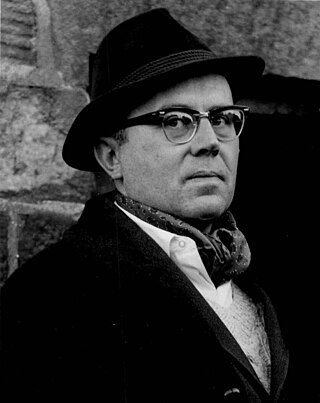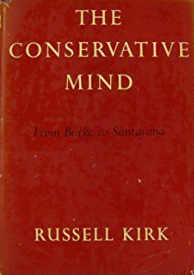Conservatism is a cultural, social, and political philosophy and ideology, which seeks to promote and preserve traditional institutions, customs, and values. The central tenets of conservatism may vary in relation to the culture and civilisation in which it appears. In Western culture, depending on the particular nation, conservatives seek to promote and preserve a range of institutions, such as the nuclear family, organised religion, the military, the nation-state, property rights, rule of law, aristocracy, and monarchy. Conservatives tend to favour institutions and practices that enhance social order and historical continuity.

Mecosta is a village in Mecosta County in the U.S. state of Michigan. The population was 386 at the 2020 census, down from 457 in 2010. The village is within Morton Township. Mecosta Township, which is also in Mecosta County, is located several miles to the west.
Paleoconservatism is a political philosophy and strain of conservatism in the United States stressing American nationalism, Christian ethics, regionalism, traditionalist conservatism, and non-interventionism. Paleoconservatism's concerns overlap with those of the Old Right that opposed the New Deal in the 1930s and 1940s as well as with paleolibertarianism. By the start of the 21st century, the movement had begun to focus more on issues of race.
Labor history is a sub-discipline of social history which specializes on the history of the working classes and the labor movement. Labor historians may concern themselves with issues of gender, race, ethnicity, and other factors besides class but chiefly focus on urban or industrial societies which distinguishes it from rural history.

Irving Babbitt was an American academic and literary critic, noted for his founding role in a movement that became known as the New Humanism, a significant influence on literary discussion and conservative thought in the period between 1910 and 1930. He was a cultural critic in the tradition of Matthew Arnold and a consistent opponent of romanticism, as represented by the writings of Jean-Jacques Rousseau. Politically he can, without serious distortion, be called a follower of Aristotle and Edmund Burke. He was an advocate of classical humanism but also offered an ecumenical defense of religion. His humanism implied a broad knowledge of various moral and religious traditions. His book Democracy and Leadership (1924) is regarded as a classic text of political conservatism. Babbitt is regarded as a major influence over American cultural and political conservatism.

Russell Amos Kirk was an American political philosopher, moralist, historian, social critic, literary critic, and author, known for his influence on 20th-century American conservatism. His 1953 book The Conservative Mind gave shape to the postwar conservative movement in the U.S. It traced the development of conservative thought in the Anglo-American tradition, giving special importance to the ideas of Edmund Burke. Kirk was considered the chief proponent of traditionalist conservatism. He was also an accomplished author of Gothic and ghost story fiction. He is often considered one of the most significant conservative men of letters of the twentieth century.
Conservatism in the United States is based on a belief in individualism, traditionalism, republicanism, and limited federal governmental power in relation to U.S. states. It is one of two major political ideologies of the United States. Conservative and Christian media organizations and American conservative figures are influential, and American conservatism is a large and mainstream ideology in the Republican Party and nation. As of 2021, 36 percent of Americans consider themselves conservative, according to polling by Gallup, Inc.

Peter Robert Edwin Viereck was an American writer, poet and professor of history at Mount Holyoke College. He won the Pulitzer Prize for Poetry in 1949 for the collection Terror and Decorum. In 1955 he was a Fulbright Scholar at the University of Florence.
Bruce P. Frohnen is a Professor of Law at Ohio Northern University College of Law, where he teaches courses in Public and Constitutional Law, Jurisprudence, and Legal Profession.

Jeffrey Peter Hart was an American cultural critic, essayist, columnist, and Professor Emeritus of English at Dartmouth College.
Traditionalist conservatism, often known as classical conservatism, is a political and social philosophy that emphasizes the importance of transcendent moral principles, manifested through certain posited natural laws to which it is claimed society should adhere. It is one of many different forms of conservatism. Traditionalist conservatism, as known today, is based on Edmund Burke's political views as well as the views of Joseph de Maistre. Traditionalists value social ties and the preservation of ancestral institutions above what they perceive as excessive individualism. One of the first uses of the phrase "conservatism" began around 1818 with a monarchist newspaper named "Le Conservateur", written by Francois Rene de Chateaubriand with the help of Louis de Bonald.
James Everett Seaton was an American writer, professor and literary critic. He argued for the continued relevance and importance of the tradition of literary humanism championed by Matthew Arnold and later, Irving Babbitt and Paul Elmer Moore. At the same time he opposed many of the dominant trends in Academia regarding literary criticism and the teaching of literature, such as the Cultural Studies model instituted by Stuart Hall and the general emphasis away from the study of literary works themselves in favor of a focus on critical theory.
Mark C. Henrie is President of the Arthur N. Rupe Foundation. He is the former Chief Academic Officer and former Senior Vice-President of the Intercollegiate Studies Institute. He was the editor of the Intercollegiate Review and senior editor of Modern Age.
George H. Nash is an American historian and interpreter of American conservatism. He is a biographer of Herbert Hoover. He is best known for The Conservative Intellectual Movement in America Since 1945, which first appeared in 1976 and has been twice revised and expanded.

Democracy and Leadership is a book by Irving Babbitt, first published by Houghton Mifflin in 1924. A new edition was published by Liberty Fund Inc. in 1979, with an introduction by Russell Kirk.

The Conservative Mind is a book by American conservative philosopher Russell Kirk. It was first published in 1953 as Kirk's doctoral dissertation and has since gone into seven editions, the later ones with the subtitle From Burke to Eliot. It traces the development of conservative thought in the Anglo-American tradition, giving special importance to the ideas of Edmund Burke.
Traditionalist conservatism in the United States is a political, social philosophy and variant of conservatism. While classical conservatism has been largely based on the philosophy and writings of Aristotle, Edmund Burke, and Joseph de Maistre, the American variant has been influenced by thinkers such as John Adams and Russel Kirk.

Philipp W. Rosemann is a German philosopher and Cottrill-Rolfes Chair at University of Kentucky. Previously he was Professor of Philosophy at Maynooth University. He is the co-editor of Dallas Medieval Texts and Translations. Prior to his tenure at Maynooth, he taught at the University of Dallas for twenty years.
Peter James Stanlis was an American academic noted for his work on Edmund Burke and Robert Frost.
The Imaginative Conservative (TIC) is an American online conservative journal, founded in 2010.








